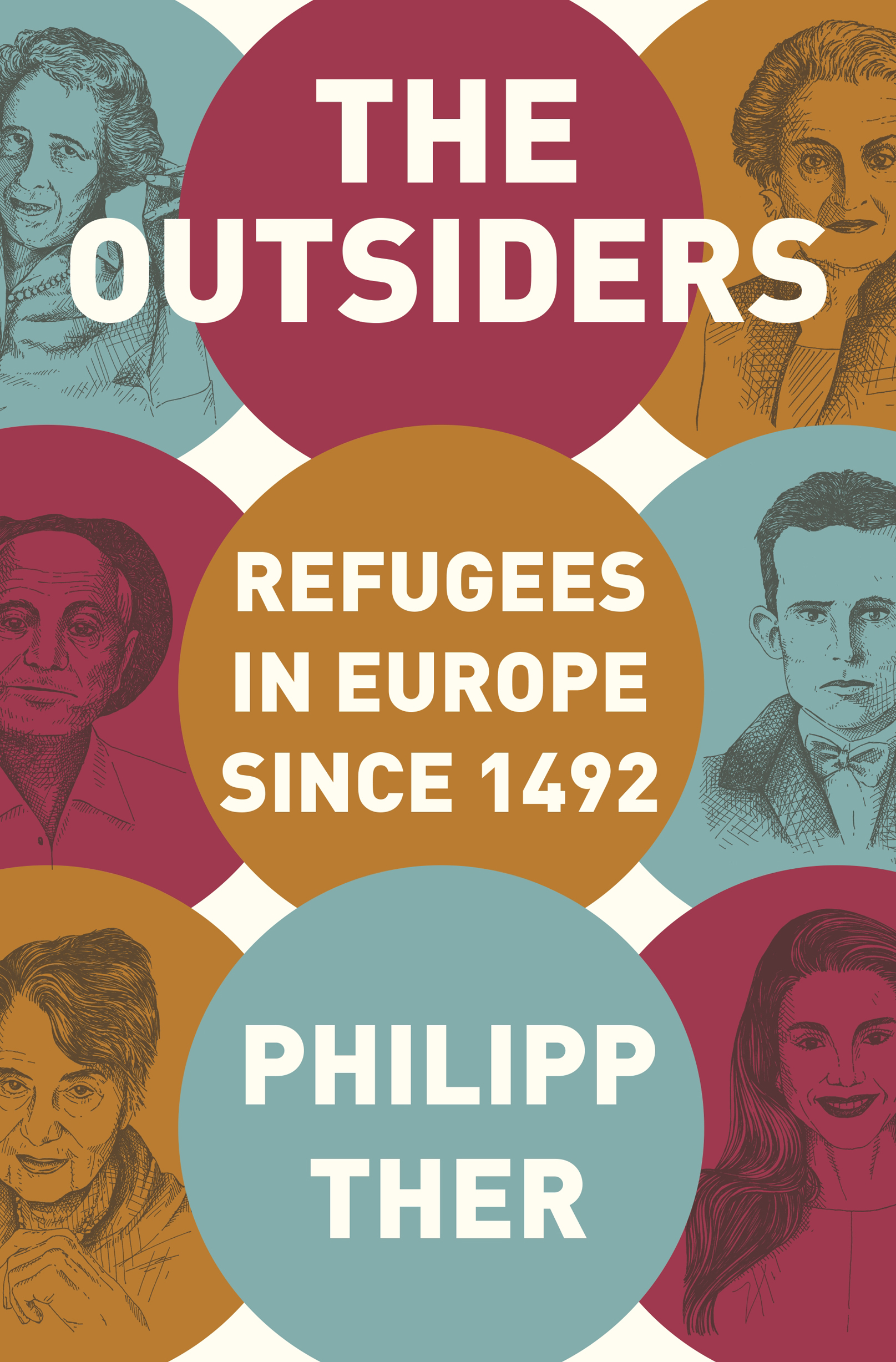Philipp Ther - The Outsiders
Here you can read online Philipp Ther - The Outsiders full text of the book (entire story) in english for free. Download pdf and epub, get meaning, cover and reviews about this ebook. year: 2019, publisher: Princeton University Press, genre: Science / Politics. Description of the work, (preface) as well as reviews are available. Best literature library LitArk.com created for fans of good reading and offers a wide selection of genres:
Romance novel
Science fiction
Adventure
Detective
Science
History
Home and family
Prose
Art
Politics
Computer
Non-fiction
Religion
Business
Children
Humor
Choose a favorite category and find really read worthwhile books. Enjoy immersion in the world of imagination, feel the emotions of the characters or learn something new for yourself, make an fascinating discovery.

- Book:The Outsiders
- Author:
- Publisher:Princeton University Press
- Genre:
- Year:2019
- Rating:5 / 5
- Favourites:Add to favourites
- Your mark:
- 100
- 1
- 2
- 3
- 4
- 5
The Outsiders: summary, description and annotation
We offer to read an annotation, description, summary or preface (depends on what the author of the book "The Outsiders" wrote himself). If you haven't found the necessary information about the book — write in the comments, we will try to find it.
The Outsiders — read online for free the complete book (whole text) full work
Below is the text of the book, divided by pages. System saving the place of the last page read, allows you to conveniently read the book "The Outsiders" online for free, without having to search again every time where you left off. Put a bookmark, and you can go to the page where you finished reading at any time.
Font size:
Interval:
Bookmark:

THE OUTSIDERS
THE OUTSIDERS
Refugees in Europe since 1492
PHILIPP THER
TRANSLATED BY JEREMIAH RIEMER
RINCETONNIVERSITYRESS
NCETON ANDXFORD
English Translation Copyright 2019 by Princeton University Press
Originally published as Die Auenseiter: Flucht, Flchtlinge und Integration im modernen Europa Suhrkamp Verlag Berlin 2017
Requests for permission to reproduce material from this work should be sent to permissions@press.princeton.edu
Published by Princeton University Press
41 William Street, Princeton, New Jersey 08540
6 Oxford Street, Woodstock, Oxfordshire OX20 1TR
press.princeton.edu
All Rights Reserved
Library of Congress Control Number: 2019936643
ISBN: 978-0-691-1-7952-0
eISBN 9780691195346
Version 1.0
British Library Cataloging-in-Publication Data is available
The translation of this work was funded by Geisteswissenschaften InternationalTranslation Funding for Work in the Humanities and Social Sciences from Germany, a joint initiative of the Fritz Thyssen Foundation, the German Federal Foreign Office, the collecting society VG WORT and the Brsenverein des Deutschen Buchhandels (German Publishers & Booksellers Association).
Editorial: Eric Crahan and Pamela Weidman
Production Editorial: Ellen Foos
Text Design: Carmina Alvarez
Production: Merli Guerra
Publicity: James Snyder and Caroline Priday
Jacket and text illustrations: Pauline Altmann / Suhrkamp Verlag
Maps: Peter Palm
13579108642
- vii
(in alphabetical order)
Manuel Alarcn Navarro (18981939/40)
Madeleine Albright (1937-)
Hannah Arendt (19061975)
Lord George Curzon (18591925)
The Dublon family (extinguished 1944)
Jerzy Giedroyc (19062000)
Ruth Klger (1931-)
Tadeusz Kociuszko (17461817)
Alan Kurdi (20122015)
Giuseppe Mazzini (18051872)
Talaat Pasha (18741921)
Queen Rania of Jordan (1970-)
The Robillard family (1687-)
Conrad Schumann (19421998)
Mans Sperber (19061985)
Erika Steinbach (1943-)
THE OUTSIDERS
Flight and Refugees in Historical Perspective
The sight that presented itself to the members of the international commission in the refugee camps on the Greek islands and on the mainland was evidently hard to put into words:
On the humanitarian side, imagination cannot encompass the event. Only those can attempt to understand who have seen destitution, misery, disease and death in all their possible forms, and the scale of disaster is so unprecedented as to demand a new vision even from such persons.
A reporter for Foreign Affairs made do with comparisons from the animal kingdom: [The] refugees maintained a fox-like existence in tents, wooden barracks, shelters of twigs, or of turf, even in caves.
In Germany it was too cold for these kinds of accommodations, but a report in the Neue Berliner Zeitung about the Scheunenviertel (the Berlin neighborhood that was home to Jews and other poor immigrants from Eastern Europe) depicted a situation just as desperate:
That boardinghouse is currently home to 120 Jewish refugees from the East. Many of the men arrived straight from Russian POW camps. Their ragged garments were a weird and wonderful hodgepodge of internationalist working class uniforms. In their eyes I saw millennial sorrow. There were women there too. They carried their children on their backs like bundles of dirty washing. Other children, who went scrabbling through a rickety world on crooked legs, gnawed on dry crusts.
In Viennese emergency centers circumstances were not much better; according to contemporary reports, twenty-five refugees on average were housed in a single dwelling, eight to ten people to a room.
The author of this moving report about the Scheunenviertel was the writer Joseph Roth, who himself was forced to take flight several times during his life. His last escape in 1933 and the reasons that made him leave Germany were so unbearable for him that he drank himself to death in his Parisian exile. The two other passages cited above also come from 1923; they recount the misery of Greeks from Asia Minor following the exchange of populations agreed to internationally at the conference of Lausanne. In Europe and its near neighborhood in the Middle East, a genuine refugee crisis was unfolding at that time, in part along the same Mediterranean and Balkan route that the refugees of 2015 would take. The scale of the mass flight nearly a hundred years ago was, however, incomparably greater. In the early 1920s, about seven million people were in flight: nearly three million fleeing the revolution and civil war in Russia, two million fleeing the Greco-Turkish war that erupted in 1919, and more than one and a half million attempting to escape various wars and local conflicts toward the end of the long First World War, a war that did not really come to a close in Eastern and Southeastern Europe until around 1923.
Yet these streams of refugees (metaphors invoking a force of nature became current at the time) were a mere trickle compared with the deluge that followed from National Socialism and the Second World War. In the 1940s at least thirty million people were on the run in Europe, a number that does not even include displaced forced laborers and prisoners of war. Two to three million people wandered the streets of occupied Germany in 1945, along with several hundred thousand each in Poland, Hungary, Czechoslovakia, Austria, Yugoslavia, Bulgaria, Romania, Greece, Finland, and the Soviet Union. Old people and children especially were often no match for the hardships they faced.
The humanitarian disasters that followed both world wars did produce at least one positive outcome, however: the international community took up the challenge of refugees. In 1921 the recently established League of Nations, in reaction to the mass flight from the Bolsheviks, appointed the well-known Norwegian naturalist and explorer Fridtjof Nansen as High Commissioner for Russian Refugees.
Later in the 1920s there was a brief pause in this history of massive refugee movements. Owing to an improved economic situation, those who had recently fled their home countries were able to strike roots in their countries of exile. Some countries, like France, even took in refugees willingly in order to compensate for their demographic losses from the war. But as early as 1933, the next mass exodus was under way, at first from Germany. Almost 60,000 people fled the National Socialists, and by the end of the decade they were followed by 370,000 more, most of them Jews. The League of Nations reacted to this new challenge in 1933 with a convention for refugees from Germany, which was followed in 1938 by a similar convention for refugees from Austria. Unlike the situation in the early 1920s, the immediate plight of the refugees was no longer the major problem; instead, it was the reluctance of countries to admit them. At the infamous Conference of vian, all attempts at the admission and international resettlement of Jewish refugees failed. Hundreds of thousands of Jews who were no longer able to flee from Germany and German-annexed Austria in time died in German concentration camps.
After the Second World War, the international community drew far-reaching conclusions from this experience. In 1946, under the umbrella of the United Nations, the International Refugee Organization (IRO) was founded, an institution that initially attended to displaced persons (DPs) in Germany, Austria, Italy, and other countries. Four years later, after tough negotiations, the UNHCR (United Nations High Commissioner for Refugees) emerged from out of the IRO, and to date this organization has been charged with the welfare of refugee groups all over the world. The British historian Peter Gatrell records the growth of international refugee assistance and the expanded scope of the tasks it has been assigned, though often after serious delays, andto this daywithout adequate financial resources.
Font size:
Interval:
Bookmark:
Similar books «The Outsiders»
Look at similar books to The Outsiders. We have selected literature similar in name and meaning in the hope of providing readers with more options to find new, interesting, not yet read works.
Discussion, reviews of the book The Outsiders and just readers' own opinions. Leave your comments, write what you think about the work, its meaning or the main characters. Specify what exactly you liked and what you didn't like, and why you think so.










